Insider’s Guide To Strengthening Families Through Protective Factors
Trauma, violence, and abuse exist in our society, but they are not inevitable—nor do they have an equal impact. Families can learn, grow, and change when people are given opportunities to safely share their challenges and strengths and learn from each other.
The Be Strong Families approach focuses on peer-to-peer connections nurtured in Parent Cafés. First developed in 2007 by parent leaders from Strengthening Families Illinois, the Parent Café process uses a peer-led approach to build Strengthening Families™ Protective Factors within families.
This guide explores the five Strengthening Families™ Protective Factors as a response to child abuse and neglect. It also shares details on Be Strong Families’ unique approach to solving parenting challenges. It introduces people who have shared their struggles and learned from each other in their parenting journeys. Finally, it demonstrates the power of working together to strengthen families — and your ability to make a difference.
What Are the Protective Factors?
Being a parent or caregiver is filled with opportunities for growth. As we raise children in a world filled with increasing challenges, it is imperative to have tools that assist parents in creating spaces where children feel physically and emotionally safe. Protective Factors are those components put in place to protect families. Parents show their children how to be strong and flexible (resilience), they model having healthy relationships, and they are continuous learners who are not afraid to ask for help and communicate in ways that build their families.
Why is this important?
Why Do We Need to Strengthen Families?
Strengthening families saves lives and improves the quality of life for children and parents. Child abuse and neglect are all too common in today’s stressful world, and they are considered adverse childhood experiences (ACEs). When someone experiences or witnesses violence in their home or community, has a family member attempt or die by suicide, or grows up with family members with substance use issues or incarceration, they have experienced an ACE. According to the Centers for Disease Control (CDC), approximately 60% of adults report they had experienced at least one ACE before they turned 18, and 17% report experiencing at least four.
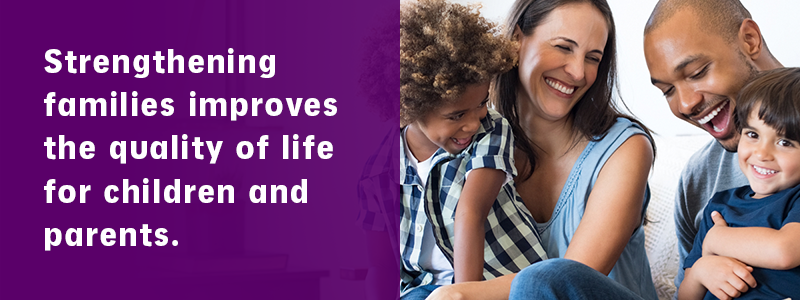
Abuse and Neglect
Child abuse and neglect are dangerous ACEs and can have life-long effects on mental and physical health. The CDC lists the following four common types of abuse and neglect:
- Physical abuse: hitting, kicking, shaking, burning, or using force against a child
- Sexual abuse: forcing a child to engage in sexual acts
- Emotional abuse: harming a child’s self-worth or emotional well-being by calling them names, shaming them, withholding love, or threatening them
- Neglect: failing to meet a child’s basic physical needs for housing, food, clothing, education, medical care — or ignoring their emotional needs
According to the CDC, at least one in seven children experience abuse or neglect in the United States. This ratio may actually be higher because many cases go unreported. The stresses and trauma related to poverty mean that rates of abuse and neglect are significantly higher for children living in poverty.
In addition to the unquantifiable pain of abuse and neglect, there is a significant monetary burden associated with abuse and neglect; the CDC estimated that burden to be $592 billion in 2018.
The Center for the Study of Social Policy developed the Strengthening Families framework, which outlines a set of protective factors that help families reduce the risks of abuse and neglect by learning from each other. Be Strong Families Parent Cafés and resources are all aligned with the Protective Factors.
The 5 Strengthening Families™ Protective Factors
-
Parental Resilience
In order to deal with the stresses of life, parents need to be strong and able to bounce back from adversity. They need to be psychologically and emotionally healthy in order to be present with their families and focus on long-term solutions instead of reacting negatively to difficult situations. Resilience requires role models, resources, and encouragement. Sometimes it means learning new parenting skills and strategies, especially if someone was treated harshly as a child. -
Positive Social Connections
Parents need connections to positive, trusted friends in the community. They can work together to brainstorm about problems, back each other up for childcare, and share the burdens and challenges of parenting. Strong relationships allow people to celebrate together when things are going well. -
Knowledge of Parenting and Child/Youth Development
Children do not come with instruction manuals, which is why it is important for parents to gain knowledge of parenting and child development. This knowledge helps parents understand what can be expected of children at certain life stages. When children act out or challenge them, the parents can learn ways to cope with behavior that does not involve overly harsh punishment. Knowledge is a community resource that can be shared, and built upon, to improve the well-being of entire communities. -
Concrete Support
Everybody needs help sometimes, and families that can get help when they need it can stay strong and healthy. Asking for help when you need it is a sign of strength. Whether it is a sudden crisis, like a job loss or death in the family, or an ongoing challenge like substance abuse or depression, it is important to ask for and receive help. Some families need direct assistance such as health care, food, housing, or job training. Thriving communities know how to provide the support that families need to survive tough times. -
Social and Emotional Competence
Parents and children need to communicate, and parents can help children learn to manage their emotions, express their needs and feelings, deal with conflict, and get along with others. Healthy families are places where both parents and children develop the ability to express their needs. Good communication skills help parents understand what is normal and what is not for children at various ages and developmental stages and can help parents get specialized help and interventions for children with special needs or disabilities.
Once we understand what the Protective Factors™ are and how they help families thrive, we can focus on creating supportive organizations and communities where parents can share knowledge and skills.
Our Approach to Strong Families
The Be Strong Families approach focuses on peer-to-peer connections nurtured in Parent Cafés. First developed in 2007 by parent leaders from Strengthening Families Illinois, the Parent Café process uses a peer-led approach to build Strengthening Families™ Protective Factors within families.
Parent Cafés provide opportunities for parents to share challenges, wisdom, strategies, and reflection on their parenting challenges and victories. They are physically and emotionally safe spaces where people practice cultural humility. They lean into the conversation, including the discomfort, and without professional hats. They share experiences based on Protective Factors to create thriving families. Parent Café participants often leave feeling inspired, energized, and excited to put into practice what they’ve learned.
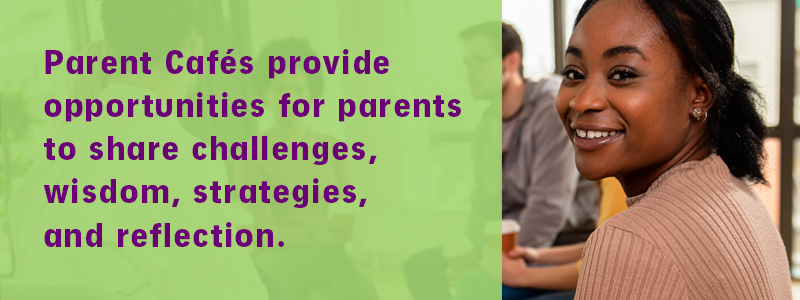
We have spent years fine-tuning the Parent Cafés to develop a highly sustainable model. The Parent Café model provides training reinforcement, institutional support, and organizational commitment, which engages and affirms parents as leaders. Parent Cafés were developed as in-person experiences, but the COVID-19 pandemic taught us to adapt them to also work online.
Why This Approach Works
“I always feel better after a Parent Café. I get in touch with who and how I want to be as a parent.” – Parent, Illinois
“Siempre me siento mejor después de un Café para Padres. Me pongo en contacto con quién y cómo quiero ser como padre.” – Padre, Illinois
The Be Strong Families approach is rooted in our values of family, authenticity, liberation, vitality, collaboration, excellence, love, and spirit. We believe in the power of parents and families to transform their own families, communities, and the world around them.
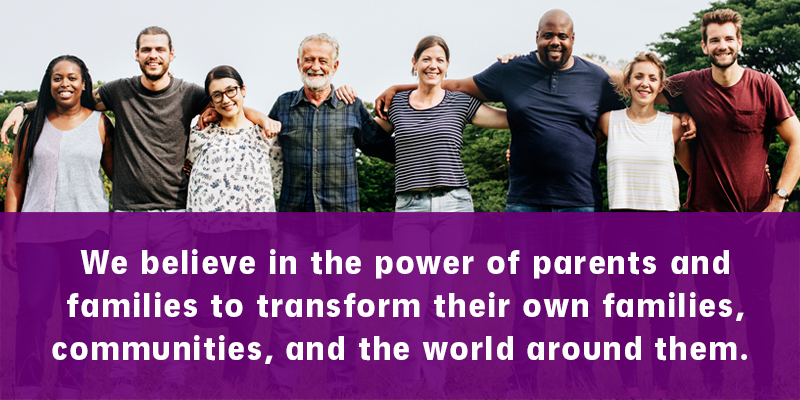
The Role of Cafés in Healing Trauma
Trauma, especially trauma experienced in early childhood, has a lasting impact on people’s emotional, cognitive, and social development. Young people who experience trauma often have
- Difficulty forming secure attachments because they fear rejection or abandonment. They may behave unpredictably as they feel a desire for intimacy and also fear it.
- Boundary issues. Children exposed to trauma or abuse might not learn appropriate boundaries, either tolerating others’ inappropriate behavior or violating others’ boundaries.
- Low self-worth, leading them to stay in relationships where they are undervalued or mistreated.
- Hypervigilance, constantly looking out for threats.
- Trouble with emotional regulation, including explosive arguments, withdrawal, or other maladaptive interactions.
- Trouble reading social cues, leading to misunderstandings and conflicts.
- Over-dependency, as they seek the safety and security they lacked in childhood.
- Difficulty with intimacy due to a fear of becoming vulnerable.
- Fear of abandonment that leads to clinging, testing relationships, or pushing others away to avoid rejection.
The best way to heal interpersonal trauma is through corrective social experiences, like Parent Cafés, which provide spaces that have clear boundaries and agreements.
Parent Café Agreements
Parent Café hosts and participants agree to a set of simple principles developed by parents to create an optimal environment for learning, growing, and listening. Those agreements are:
- Listen attentively, don’t interrupt
- Speak from your own experience, use I statements
- No judgments, positive or negative,
- Do not give advice
- Confidentiality: what happens in the cafe, stays in the cafe
- Full presence — no electronic distractions
These agreements allow participants to interact with others in non-conflictual, respectful, non-judgmental ways. As participants experience being able to talk (or not talk) without being shut down or forced to answer when they don’t want to, they experience being understood at a deep level by peers who feel with them but don’t invade their personal space or try to fix them. They have an experience of healthy relating, which allows vigilance to be relaxed and opens a pathway to trust. Having others witness and affirm, even silently, and tacitly, is an important step in the healing process.
The whole spectrum of emotion is welcome at Cafés: people laugh, they cry, and the collective holds space for all of that (with a helping professional available for those who need more in the moment than the Cafe context itself can provide). The questions discussed at Café tables are designed to be both generative and appreciative, which means the arc of the conversations leans toward the positive.
The social support provided at Cafés reduces isolation. People who participate regularly seek the familiar structure, which serves as a ritual that promotes healing. They come to know that there are people who care, listen, and understand. Social support can bolster resilience, allowing trauma survivors to bounce back from adversity more effectively. A strong social network can provide both emotional and practical support during challenging times.
That is why the Be Strong Families approach is being promoted and replicated around the country.
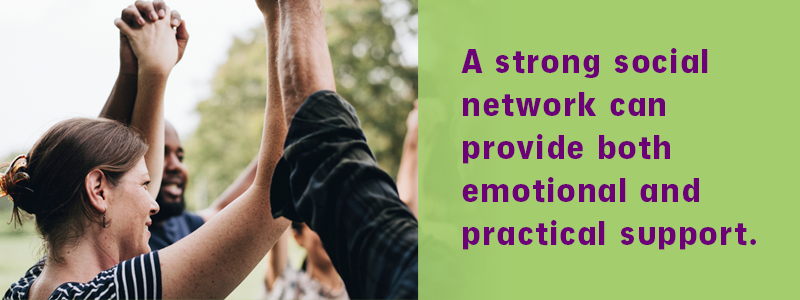
Organizations and Be Strong Families Parent Cafés
Parent Cafés nurture connections between staff and parents, and among parents in ways that strengthen organizations and communities. In 2022, Be Strong Families joined Tufts Medical Center, the Center for the Study of Social Policy, and the University of Buffalo to build the parent engagement capacity of three partners in the Help Me Grow national network: Marin County, Washington D.C., and Northwest Florida.
These partners are empowering parents to lead the process of “goal-concordant care,” a collaborative approach that relies on trusting relationships between program staff and parents.
When parents engage in authentic small-group conversations about family life with their peers and program staff, their feelings and thoughts are validated. They often find relief from the stresses of everyday life and opportunities to reflect, to step back and get clear on who they are as parents and what they want for their children, and to share those deep, important, meaningful aspirations and real barriers with other parents. Cafés provide a safe context and sacred time for individual deep self-reflection and peer-to-peer learning.
When community-based programs incorporate Parent Cafés into their programming, it represents a long-term commitment to parent engagement that breaks down barriers and shifts power dynamics in the relationships between staff and parents. In addition, Be Strong Families parent engagement skill-building workshops support staff in implementing Parent Cafés and incorporating the Strengthening Families™ Protective Factors into their parent-led approach.
The Data Shows That Parent Cafés Work
Since the launch of the first Parent Cafés in 2007, hundreds of programs in the United States and around the world have adopted the approach, reaching thousands of parents and families through deep, personal conversations designed to facilitate transformation and healing.
In 2019, the National Parent Café Evaluation Project began to collect data to share the impact of Parent Cafés. The following are key trends in data collected between 2019 and 2021.
- Over three years, 96 partner programs participated in the National Café Evaluation.
- Partners hosted 895 Cafés, and close to 14,000 individuals filled out the evaluation form.
- In 2019 about 33% of those who filled out the Café evaluation forms identified as Black, Indigenous, or People of Color (BIPOC); by 2021 the percentage was 60%, nearly double.
- Over the three years, BSF reached more than 10,000 individuals who identified as having complex parenting issues. This includes but is not limited to foster parents, adoptive parents, grandparents raising grandchildren, teens/youth with a child, parents of children with disabilities, parents of an LGBTQ+ child, and LGBTQ+ parents.
When parents participate in Cafes, they come back. More than 20% of people reported they participated in more than six Cafés, and nearly 12% participated in more than 10 Cafés. The evaluations show parents’ growth in building protective factors. Equally important, more than 96% of participants indicate that Cafés are safe spaces where they can learn from each other and reflect on their lives as parents.
Fostering Leadership
The evaluations showed that more than 87% of participants wanted to be more involved with the host organization or become part of the Café team. This shows the success of the model in not only helping parents but supporting them to become leaders in their communities.
Expanding the Circle of Inclusion
As we continue to grow our mission and circle of change, we have focused on developing and sustaining conversations that promote equitable inclusion of LGBTQIA+ children, youth, and adult family members. We have set goals that are consistent with our stance on anti-racism and equity, diversity, and inclusion (EDI).
Current estimates show that there are approximately 3.2 million LGBTQIA+ youth between the ages of 8 and 18 living in the US and more than half a million same-sex couples raising children. LGBTQIA+ families — especially BIPOC children and families — are often underserved by mainstream family service and education providers, and we recognize that the Café model can grow to forge new partnerships and advance these goals.
We are working to revise and create new resources — like Home Is Where the Heart Is: Conversations to Love and Affirm Your LGBTQIA+ Children (Parent Cafe Booster Pack) and #WoWTALK Café — that will fully include LGBTQIA+ parents and families. We continue to host webinars in English and Spanish on LGBTIQA+ topics.
Stories of Families Getting Stronger
“We want you to come in and say, ‘Hey, this hard life has been happening, but just for a moment—for 3 hours—we are going to give you a sense of love that you have never felt before.”
— Parent Café participant
The true success of Parent Cafés is the quiet transformations that are happening inside individual participants, rippling out to families and communities.
Stephanie: “I Found Hope — and I Found My Purpose”
Stephanie is a mother of three who credits Parent Cafés with helping her overcome depression and find a community of support and healing. Today Stephanie is a member of the Parent Café leadership team. She and her mother immigrated here from Mexico when Stephanie was 13, and she was sexually abused by her stepfather. “I was not safe,” says Stephanie. She left home at 17 and had her first child at 20. Soon after her second baby was born, her firstborn was diagnosed with autism.
“I forgot about me, and I forgot about my baby. I felt so lonely because my husband was working all the time,” says Stephanie. Soon after, she was diagnosed with postpartum depression, and realized she had struggled with depression her whole life. She says she felt “bitter,” and was losing the will to live. Stephanie started going to virtual Parent Cafés during the pandemic. “To be honest, everything changed from that point on,” says Stephanie. “I felt like I found hope for the first time. The Cafés are where I found hope and where I found my purpose.”
Melissa: “Removing that Barrier”
Melissa is a single parent who experiences debilitating pain from arthritis and scoliosis. As she explains in this short documentary, she found inspiration and a community of support in Parent Cafés.
“The awesome support system that I get from the Cafés made me understand that even with me sitting alone, I’m really not,” Melissa says. “Parenting is tough, no matter how you spin it.” Our job is to be supportive, to connect you to whatever would remove that barrier that’s keeping your family from being the family you would want your family to be.”
Latisha: “Building Resilience”
As Be Strong Families Latisha Atkins puts it, her participation in Parent Cafés helped her build resilience for a future she couldn’t imagine. When she began attending Cafés, she was serving as a primary caregiver for a 2-year-old who was later murdered. “Some of the people I met through the Café I was able to lean on those folks as a shoulder.”
Families Are Thriving Because of You
When leaders are seeking sustainable models for supporting parents, they often arrive at the stories of parents and families who have transformed their conversations and relationships by participating in and leading Parent Cafés.
This approach, which empowers parents to lead deep, personal conversations about family life, has been embraced by hundreds of programs in the United States and around the world.
By participating in Parent Cafés and developing the protective factors, people are developing resilience. They are finding meaningful relationships that support them through challenges and provide respite from crises. They are also developing communication and social-emotional skills — and they are doing it naturally, without stigma.
Instead of emphasizing deficits and weaknesses, this approach revolutionizes the service model by empowering participants to transform their own families and communities.
All of this is possible because of the support of the donors and contributors that sustain us.
This simple, scalable model relies on parents’ innate understanding of their unique challenges and provides safe spaces to explore parenting challenges and become strong, resilient communities.
Creating a Healthier Future, One Family at a Time
Our detailed evaluations and our lived experience with Parent Cafés show us that this approach to family engagement works.
We see it in the stories of families who have overcome adversity, in the faces of children whose parents have learned new ways of communication, in the numbers of Parent Café participants who grow to become leaders of their own Cafés and in their own agencies and communities.
When more families learn ways to build resilience and love each other fully in this unequal and difficult world, we all thrive.
DOWNLOAD THIS PAGE AS A PDF
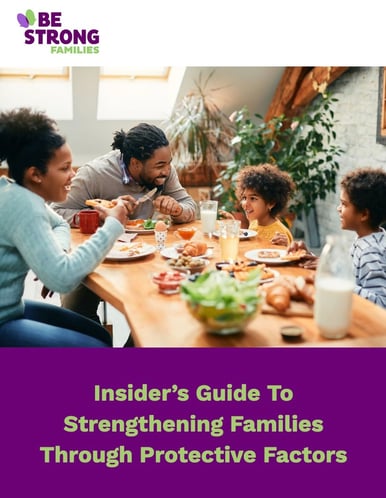


.png?width=1800&height=338&name=BSF-BLOG-800x150.pptx%20(1).png)
.png?width=800&height=150&name=BSF-BLOG-800x150.pptx%20(1).png)